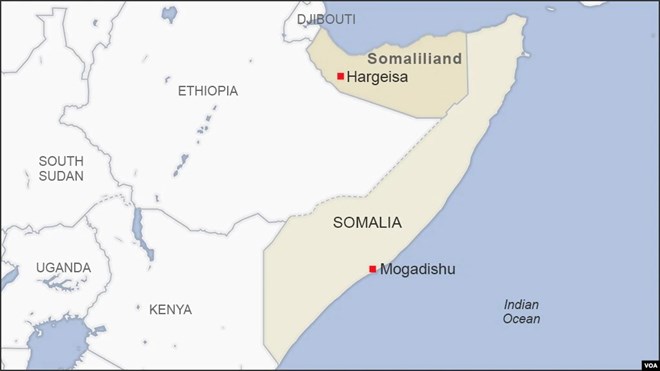
Friday August 12, 2022
By Mohamed Olad Hassan

WASHINGTON/HARGEISA — Clashes between opposition protesters and security forces in Somalia's breakaway Somaliland region have killed three people and injured nearly 90, security and medical sources said on Thursday.
Hundreds of angry supporters of the Wadani and UCID opposition parties took to the streets in at least three major cities — Hargeisa, Erigavo and Burao — setting up roadblocks, burning tires, and stoning cars and businesses.
Security officials said the protesters defied a government order containing such opposition protests only to the opposition headquarters and specific permitted sites.
The protesters were chanting slogans and holding up signs to demand that Somaliland's upcoming elections be held as scheduled.
"On time election …… election … election and no delay," read one placard.
Tensions escalated as security forces tried to disperse the protesters and fired live ammunition, according to witnesses.
The worst clashes occurred in Hargeisa, the region's capital, where protesters threw stones at police and burned tires in the streets, security sources said.
Speaking to the media in Hargeisa on Thursday evening, Somaliland's commander of police operations, Ibrahim Abdi Haji, said three civilians died in the clashes — two in Hargeisa and one in Erigavo. He said 89 people, 62 of them police officers, were injured.
Haji said the security forces arrested about 100 protesters during and after the clashes, accusing the opposition leaders of being behind the deadly violence. The Associated Press reported that some demonstrators who defied police orders to disperse were armed with knives.
"Leaders of the opposition parties will be accountable for what happened today and we have also arrested about hundred people for their involvement in the violence," said Haji.
Addressing protesters in Hargeisa, UCID party chairman Faisal Ali Warabe said opposition supporters were practicing freedom of assembly and accused the government of being behind the violence.
"We are only exercising our democratic rights and no one can silence us," said Warabe. "The government has been looking for the situation to deteriorate to this point and it's responsible for whatever happened."
The leader of the Wadani opposition party, Abdirahman Mohamed Abdullahi, better known as Cirro, told VOA that President Muse Bihi Abdi is secretly planning to postpone elections.
"I repeat again and again, President Bihi [Abdi] and his Kulmiye party have no intention of holding the presidential election. If election is not held on 13th November, we will no longer recognize him as a legitimate president," said Cirro.
He said six civilians were killed in the protests, a number that VOA could not independently verify.
Deadlocked
Leaders of the two main opposition parties of Somaliland, UCID and Wadani, have been at loggerheads with Abdi over his management of the upcoming election.
Somaliland opposition parties want the government to hold the presidential election as scheduled on November 13, while Abdi and his ruling Kulmiye party insist registration of new political organizations should come first.
Meetings to defuse the build-up of the tension failed several times, leading to the violent protests.
The U.S. Embassy in Somalia said it "strongly" urged Somaliland's ruling and opposition leaders to avoid violence in demonstrations and "return quickly to political dialogue."
A brief statement tweeted by the U.S. Embassy in Mogadishu warned that failure to agree on the election threatens Somaliland's "achievements in democratic governance."
A breakaway republic from Somalia positioned along the Gulf of Aden and home to the deep-water strategic port of Berbera, Somaliland has maintained self-rule since 1991 but has not won international recognition.
Dubai-based multinational logistics firm DP World spent nearly a half-billion on a new cargo container facility at Berbera in recent years. In March, Somaliland leaders visited Washington to lobby for recognition as an independent territory, touting its stable governance and geostrategic location.
Presenting itself as a potential asset to U.S. interests in the Horn of Africa, Abdi, speaking with VOA during the visit, said his delegation secured pledges of increased U.S. support for his self-declared state.
Although the Biden administration does not intend to recognize Somaliland's independence from Somalia, some U.S. lawmakers signaled a desire for closer ties with the region, which they view as a potential bulwark against China's growing influence across East Africa.
Shortly after Abdi's visit to Washington, General Stephen Townsend, commander of the U.S. Africa Command, visited Hargeisa to meet with top officials.
As the highest-ranking U.S. military official to visit Somaliland since 1991, Townsend was accompanied by U.S. Ambassador Larry Andre and other American officials.
During their visit, the U.S. delegation toured the Berbera Port and the Berbera International Airport.
Sagal Mustafe and Khadar Akulle contributed to this report.